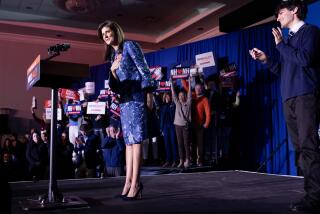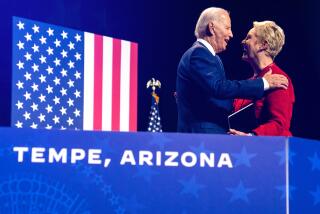McCain’s doves
John McCain will likely go down in history as the first GOP presidential nominee who vaulted to the front of the pack despite failing to win a plurality among self-identified Republicans in any of the early state primaries.
According to Florida exit polls, the Arizona senator tied Mitt Romney among voters who described themselves as Republican but pulled away to victory with a nearly 2-1 advantage among independents. That formula -- battle to a draw for Republicans, stomp all comers among independents -- powered McCain’s wins in New Hampshire and South Carolina and has made him the front-runner heading into Super Tuesday.
It’s no mystery why independents gravitate toward McCain. He’s a country-first, party-second kind of guy who speaks bluntly and delights in poking fellow Republicans in the eye on issues such as campaign finance reform and global warming.
But there’s a bizarre disconnect in the warm embrace between McCain and the electorate’s mavericks. They hate the Iraq war, while he’s willing to fight it for another century. The most pro-war presidential candidate in a decade is winning the 2008 GOP nomination thanks to the antiwar vote.
A full 66% of independents think that the U.S. should completely withdraw from Iraq no later than 12 months from now, according to a Jan. 18-22 L.A. Times/Bloomberg poll. McCain, meanwhile, said last month that the U.S. might stay in Baghdad for another 100 years. He continually expresses bafflement at the idea that that might not be such a good thing. “It’s not the point! It’s not the point!” he snarled at reporters recently. “How long are we going to be in Korea?”
And yet he dominated the antiwar vote in New Hampshire, with 44% to Romney’s 19%, according to CNN exit polls. Ron Paul, the only actual antiwar Republican running, drew just 16% of voters who said they were against the war. The three finished in the same order among antiwar voters in Michigan, even though Romney won the state overall.
The same pattern holds true in the case of voters who despise George W. Bush. In Florida, for example, McCain clobbered Romney 48% to 18% among those who described themselves as “angry” at the president, according to MSNBC exit polls.
So the voters most hostile to the war are backing a potential commander in chief who makes Bush look gun-shy. More than three years before the Bush administration elucidated the radical doctrine of preemptive war, McCain unveiled a plan during his first run at the presidency called “rogue-state rollback,” in which “we politically and materially support indigenous forces within and outside of rogue states” -- including Iraq, North Korea and Serbia -- “to overthrow regimes that threaten our interests and values.” And if the “odious regimes” crack down on freedom fighters, the U.S. should respond with force. In that campaign, McCain was the neocons’ choice against the more internationally “humble” George Bush.
McCain has advocated threatening North Korea with “extinction,” and memorably sung about how we should “bomb bomb bomb, bomb bomb Iran.” He agitated for military intervention in Darfur, regrets that we didn’t send troops to Rwanda and is fond of rattling sabers in the general direction of Moscow and Beijing. During the U.S. bombing of Kosovo in 1999 -- when McCain showily suspended his presidential campaign because he’d rather lose a campaign than lose a war -- the senator drew media raves for managing to support the intervention while simultaneously slamming the president for not threatening more overwhelming force.
This easily discoverable uber-hawkishness runs in the family. His four-star Navy admiral father helped prosecute the war in Vietnam and delivered famous lectures about the role of U.S. sea power in making the world safe for democracy. His four-star Navy admiral grandfather worshiped at the altar of interventionist extraordinaire Teddy Roosevelt. If the U.S. has an imperialist class, as historian (and informal McCain advisor) Niall Ferguson has advocated, then John McCain sits at its head.
Still, too many people, wowed by the candidate’s considerable charm, have convinced themselves that launching wars is for icky people like that Bush fellow, not Our John. “He knows war,” the Des Moines Register wrote, in one of roughly 17,000 newspaper endorsements of McCain over the last two months, “something we believe would make him reluctant to start one.” For Californians tempted by such delusions, it’s wise to recall the famous words of the last septuagenarian to successfully seek the presidency: Trust, but verify.
More to Read
Get the L.A. Times Politics newsletter
Deeply reported insights into legislation, politics and policy from Sacramento, Washington and beyond. In your inbox three times per week.
You may occasionally receive promotional content from the Los Angeles Times.










